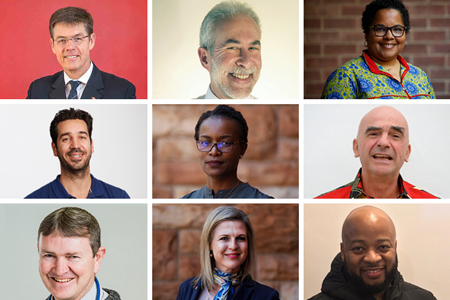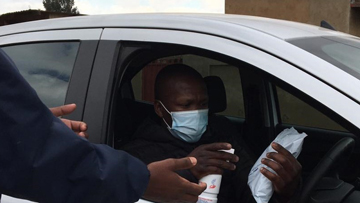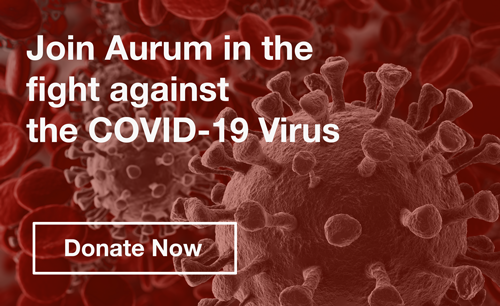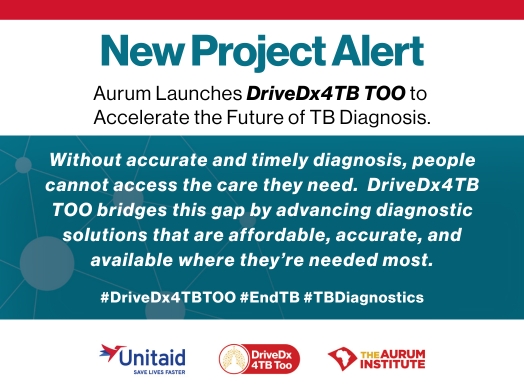Aurum nurses Faith Majola, Marcia Roberts, Nokuthula Malinga and Lerato Matlala
Life in the time of COVID-19 is very different for many people. For Faith Majola, it has meant enduring the lockdown alone by halting visits to her family to protect them as she is potentially exposed to the Coronavirus every day. She is a nurse with The Aurum Institute and was one of the health workers seconded to national duty supporting the Department of Health to conduct Coronavirus contact tracing.
8:00 Since the start of the lockdown, Majola no longer reports to the Germiston clinic where she works but starts her day in a district health boardroom. Here she and fellow Aurum nurses Marcia Roberts, Nokuthula Malinga and Lerato Matlala join colleagues from the Department of Health and City of Ekurhuleni to form two teams. Between them, the teams divide a list of people who have been in contact with someone who tested positive for COVID-19.
9:00 They contact the people on the list and arrange a suitable time to visit their home to conduct the test. They also ask the person to prepare a place outside the home for the team to change into full personal protective equipment.
“In the beginning, some people refused. Mainly they were afraid of being stigmatised or that we are bringing the virus which was one of the myths circulating in the early days on social media. This was always an opportunity for us to educate and inform and as the days went on and more awareness was created there was less of this. Generally, people consented and were willing.”
9:30 Equipment check: Red plastic for medical waste and white one for general waste ✅
Papers used for data collection ✅
Information pamphlets that we give to people ✅
Personal protective equipment ✅
10:00 They set off to the first home with Aurum mobile clinic drivers Siyabonga Zungu and Kaizer Sedutla.
10:30 - 15:00 They arrive at a person’s home and phone to be directed to the changing area where they change into full PPE before entering the home. After another explanation, the test is done. This entails swabbing the nose and throat. The specimens are placed into a plastic lab bag and packed into a cooler with ice packs and sealed for transportation to the lab.
The team advises when the results are expected and how to take precautions in the meantime. They also leave face masks, pamphlet on prevention and a thermometer for the patient to monitor their temperature which we call to check up twice a day. They also leave a medical waste bag for used masks which the team collects after 14-day incubation period. The team then removes the PPE in the designated area, packs it into medical waste bags and takes it with them to drop off at the nearest health facility to be discarded properly.
15:30 Each team does about 9 cases a day before returning to the boardroom to submit their stats and reports for the day. They also debrief in the morning, but this time it is not reports but their own thoughts and feelings which Ndlovu said makes a big contribution to their psychological wellbeing.
“It’s so important for us to let it out and commiserate with each other, we are scared. We know the prognosis is good, but Coronavirus can be deadly. What is worse is that it can spread so quickly and so little is known about it, we are learning as we go.”
17:00 Majola arrives back at her flat, removes her work clothes at the door, and heads straight for the shower, makes supper, eats and goes to bed. "I fall asleep thinking about things that mean a lot to me, things I want for my future like my own family and continuing to serve people through my work. I think about positive, meaningful things in life that I am yet to enjoy."
00:00 The insomnia hits, she does not want to relive the day but can think of nothing else. She runs through her day’s interactions for fear of having been exposed. When this fear grips her, Majola prays. “I pray for myself, my family, my health worker colleagues, the country and for this to end. It is a scary time and it is causing a lot of challenges, but I truly believe that we will get through this.”
She prays also for an end to TB and HIV which have once again become the focus of her work.
Majola has now returned to her community health centre and back on her duties including managing staff, initiating patients on treatment, and managing those who have defaulted.
“We have 7800 patients on HIV treatment, and I am not counting those we have decanted. The COVID-19 pandemic may be causing a lot of alarm at the moment, but HIV and TB remain top priorities and I am happy to serve my country, nursing patients living with any of these ailments.”
Majola has been nursing for six years and chose the profession for the opportunity to make a difference in people’s lives. It is for the same reason that she volunteered for national duty despite the possible danger to herself. “If I say no who do I expect to do it? I am also scared. Fear, especially of the unknown, can be crippling. But I have faith especially in my nursing training and the COVID-specific training we received on how to do the job right while protecting ourselves and ensuring others take precautions as well.”












